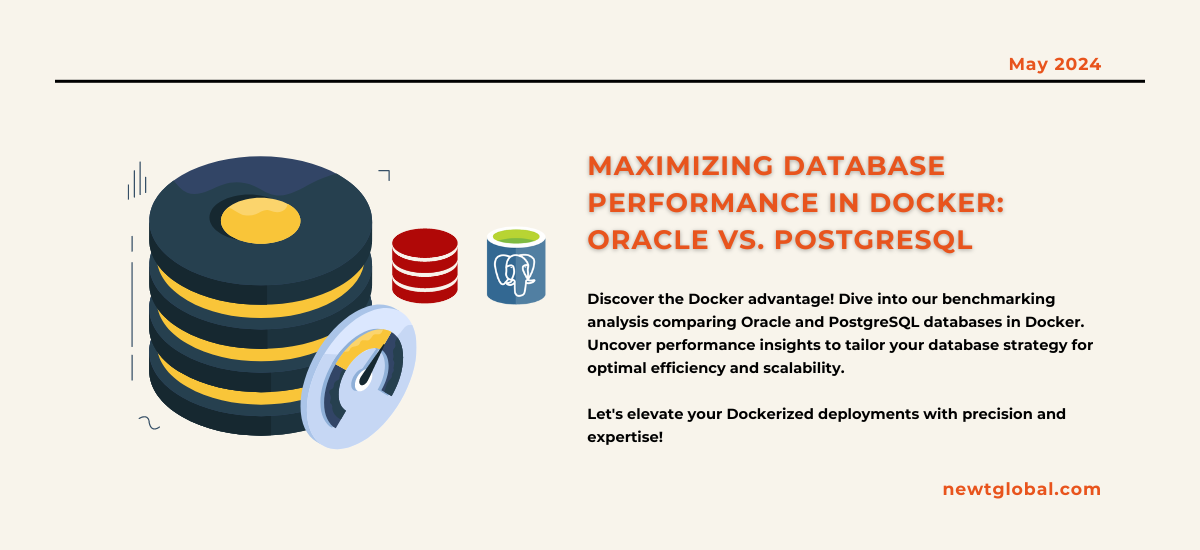
In the world of managing databases, Oracle and PostgreSQL are known for being strong, scalable, and reliable. But when you use these databases in Docker containers, it’s important to know how well they work in that kind of setup. Docker is a popular platform that helps applications and their necessary software run smoothly on different types of computers. This article compares Oracle and PostgreSQL databases in Docker containers to see how they perform and help developers make good choices.
Embracing Containerization: Docker’s Role in Modern Database Deployment
Docker is a technology that helps put applications on computers in a consistent way, making sure they run the same no matter where they are. This makes it easier to manage and operate them. We wanted to see how Docker affects the performance of Oracle and PostgreSQL databases, especially in areas like handling transactions, running queries, and using resources effectively.
Benchmarking Strategy: A Structured Approach
To objectively assess the performance of Oracle and PostgreSQL, a structured benchmarking strategy was adopted. The strategy focused on comparing the databases in equivalent Docker environments to ensure that any observed performance differences could be attributed solely to the databases themselves and not external variables. The benchmarking covered several key aspects:
-
- Setup and Configuration: Ensuring both databases were configured with comparable resources and settings within Docker to maintain a level playing field.
- Workload and Metrics: Defining a series of tasks that simulate real-world database operations, including CRUD operations (Create, Read, Update, Delete), complex queries, and concurrent user simulations. Key performance indicators (KPIs) such as transaction throughput, query response time, CPU and memory utilization were measured.
- Execution and Monitoring: Running the benchmark tests and monitoring performance using standardized tools to collect and analyze data.
Performance Insights: Oracle vs. PostgreSQL
-
- Transaction Throughput and Query Response Time
The benchmark showed that Oracle and PostgreSQL excel in different areas when handling transactions and responding to queries. PostgreSQL is particularly adept at managing numerous transactions quickly, especially for straightforward tasks, making it ideal for environments requiring rapid data manipulation. Conversely, Oracle shines in handling complex tasks and analyzing large datasets swiftly, leveraging advanced optimization techniques to minimize response times. Therefore, PostgreSQL is recommended for situations requiring fast processing of simple tasks, while Oracle is better suited for tasks involving intricate data analysis and quick insights.
-
- CPU and Memory Utilization
When it comes to using computer resources like CPU and memory, the benchmarks showed PostgreSQL doesn’t use as much memory as Oracle, which means it’s better at making the most out of Docker’s limited resources. On the other hand, Oracle is better at handling the CPU, especially when there are many tasks happening at the same time on different parts of the computer. This is especially helpful in environments where multiple things are happening at once.
-
- I/O Operations and Scalability
Both Oracle and PostgreSQL are good at handling data input and output operations, with PostgreSQL being a bit better at writing data than Oracle. However, Oracle is more efficient at reading data. When it comes to being able to grow or scale within Docker, PostgreSQL’s design makes it easier to adjust to changing workloads, which is great for applications with varying levels of activity. On the other hand, Oracle, with all its features, is a strong choice for big businesses that need a lot of room to expand and a system that can handle heavy use, even though it may require more resources.
Toward an Informed Database Strategy
Our benchmarking study shows that both Oracle and PostgreSQL databases work well in Docker, but they have their own strengths. PostgreSQL is better for handling many transactions quickly and using resources efficiently, so it’s great for places where performance and resources are limited. On the other hand, Oracle is good at optimizing complex queries and is a solid choice for applications that need to handle a lot of data.
Deciding between Oracle and PostgreSQL in Docker depends on what your application needs. Think about the kind of work your application does, how many resources you have, and how fast things need to run. But remember, both databases can be used effectively in Docker, giving you options and reliability for modern applications.
Ready to Optimize Your Database Performance in Docker?
Unlock the full potential of your Dockerized database deployments with Newt Global’s DMAP—a cutting-edge solution designed to enhance performance and scalability.
Introducing Newt Global’s DMAP: Maximizing Database Performance in Docker
Looking to optimize your Oracle and PostgreSQL databases within Docker containers?
Discover how Newt Global’s DMAP can help you achieve superior performance and scalability.
Ready to Experience the Difference?
Explore how DMAP can revolutionize your Dockerized database deployments. Visit newtglobal.com to learn more.
Have questions or need assistance? Reach out to us at marketing@newtglobalcorp.com to connect with our team of experts. Maximize Your Database Performance in Docker with DMAP.
